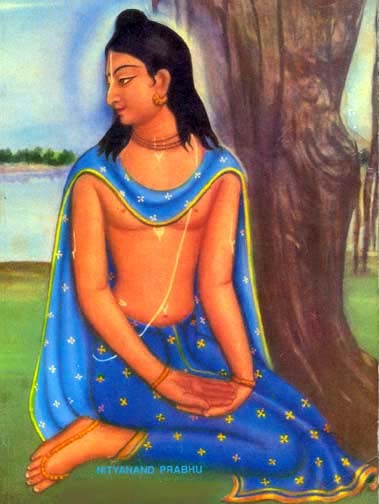Lord Nityananda Enacts Krishna’s Childhood Pastimes
By Satyaraja Dasa | Feb 18, 2008

nityanandam aham vande
karne lambita-mauktikam
caitanyagraja-rupena
pavitri-krta-bhutalam
"Salutations to Sri Nityananda Prabhu, Who has a single pearl suspended from one of His ears, Who is the elder brother of Sri Chaitanya Mahaprabhu, and Who is the purifier of the world."
Curiously, there is no authoritative biography of Nityananda Prabhu; and while Rupa, Jiva, and Raghunatha [Gosvamis] do not even mention him once in their collective writings, Sanatana Gosvami refers to him only briefly in the invocation of his Vaisnava-tosani. Nonetheless, the world is fortunate that Mahaprabhu’s biographers have devoted large sections of their work to Nityananda’s life, which can be pieced together from this massive literature, and also from later medieval Vaisnava texts, such as Bhakti-ratnakara and Prema-vilasa.
Nityananda Prabhu was born in the village of Ekcaka, also called Ekacakra, in the country of Rahri (Radhadesa), some eight miles east of where today stands the Mallarpura station of the E.I. Railway (within the modern Birbhum District of West Bengal). His birthsite is commemorated by a small temple named Garbhavasa and is visited by throngs of pilgrims to this day.
Although no authorized account of His birth is extant, it is said that He was born in or near the year 1474 and that His father’s name was Hadai Ojha. Hadai was a well known pandita, having descended from a good brahmana family whose origins were in Mithila; and his wife’s name was Padmavati. Their only son, Nityananda, was born on the auspicious thirteenth day of the bright fortnight of the month of Magh. This auspicious day was made even more auspicious by Nityananda Prabhu’s birth.
As a child, Nitai, as He was called, had a close circle of friends, and together they used to imitate the pastimes of Krsna and His associates. Once, they dressed themselves as demigods and petitioned the Lord to alleviate the burdened Earth of Kali-yuga.
Nityananda Prabhu and a playmate who was dressed as the ailing Earth, along with the other children, took their game to the Ganges, where they addressed Lord Visnu. At that time, one of the children hid behind a rock and spoke in a grave voice, "I will soon be born in Mathura to lighten the oppression of the Earth." The boys enjoyed themselves, as children do, while becoming completely absorbed in Krsna’s lila.
On another occasion, Nitai and His friends gathered in an imitation "village" to celebrate the marriage of Vasudeva and Devaki, the parents of Krsna. The following day, they made their playhouse into the prison of Kamsa and enacted the entire story of Krsna’s birth. Once, while acting out this episode, Nitai transformed the area into a cowherd settlement and took "Krsna" there, deceiving Kamsa by substituting Yogamaya for Krsna within the prison.
Performing these intricately-woven stories on a daily basis, the children became quite close and came to love Nitai as their natural leader and friend. He was the most imaginative among them, and they all laughed and shared joyful exchanges when He would dress them like demons. When they staged the Putana story, for example, they would engage in uproarious laughter when one of their friends pretended to suck the demoness’s breasts like baby Krsna. Sometimes Nitai would construct demons out of toys, naming them Bakasura, Aghasura, Vatsasura, and so on and would go through the motions of battling with them and finally killing them. His friends were so entertained by His play-acting that they would come back day after day just to see Him do it again and again.
Once in a while, His friends would take the roles of the elephant Kuvalayapida or the wrestlers Canura and Mustika: Nitai would play-fight with them, knock them down, and drag them off by the hair. By the end of the day, their stomachs would ache from laughter, and they would tell their parents about the great fun enjoyed with Nitai in play-acting.
Sometimes Nitai would bring His friends to the local milk-man and have them watch Him steal butter and yogurt, as Krsna did in His Vraja lila. The milkman, of course, did not complain. In fact, he was an accomplice, setting aside excess dairy for Nitai and His friends, expecting them to show up.
All the adults of Ekacakra adored Nitai. They were fascinated by this unique little boy, and they loved Him as their own. Seeing His total absorption in Krsna and the avataras of Visnu, they suspected that He might be some sort of Incarnation Himself.
He was relentless, day after day enacting a different pastime, and did it so skillfully that His neighbors wondered, "How is it that He is so talented? How does He know the stories so well? No one has explained all these details to Him." One day He imitated Krsna’s pastime of lifting Govardhana Hill, with all aspects of the story acted out perfectly. On another, He constructed a replica of Vrndavana, performing many parts of Krsna’s Vraja-lila with marked realism, and on still another, He pretended to steal the clothes of the gopis and visit the wives of the brahmanas engaged in sacrifice.
On one occasion, one of the boys dressed as Akrura and took Krsna and Balarama away from Vrndavana on the order of Kamsa. Nitai cried in grief, feeling the separation of the gopis. Tears of love flowed from His eyes. His acting was so authentic that it made all who watched question whether He was merely acting or in some way experiencing the part He played. This was true whether He was playing Krsna, Balarama, or even Vamana, or other Incarnations of the Lord. "Nitai, where have you learned all this?" one of the neighborhood ladies asked. Nityananda enjoyed her question. "They are My own divine pastimes," He said, "and I am allowing you to see them." The townspeople laughed, shaking their heads. They did not know what to make of Him.















